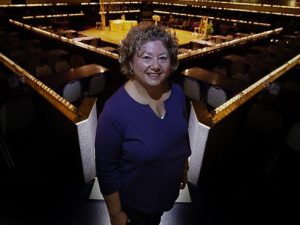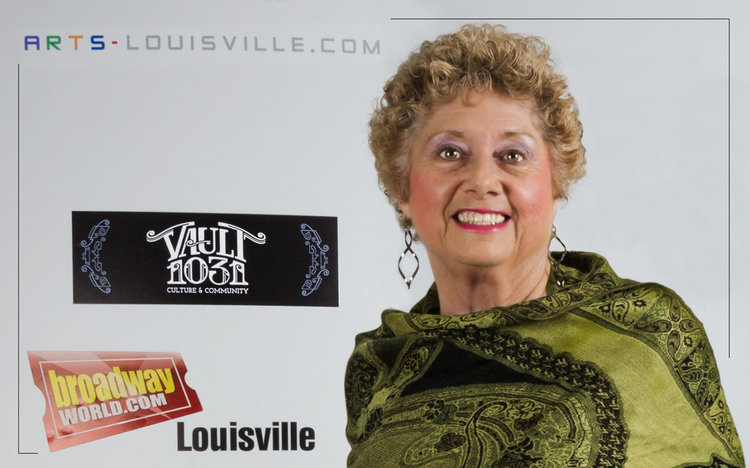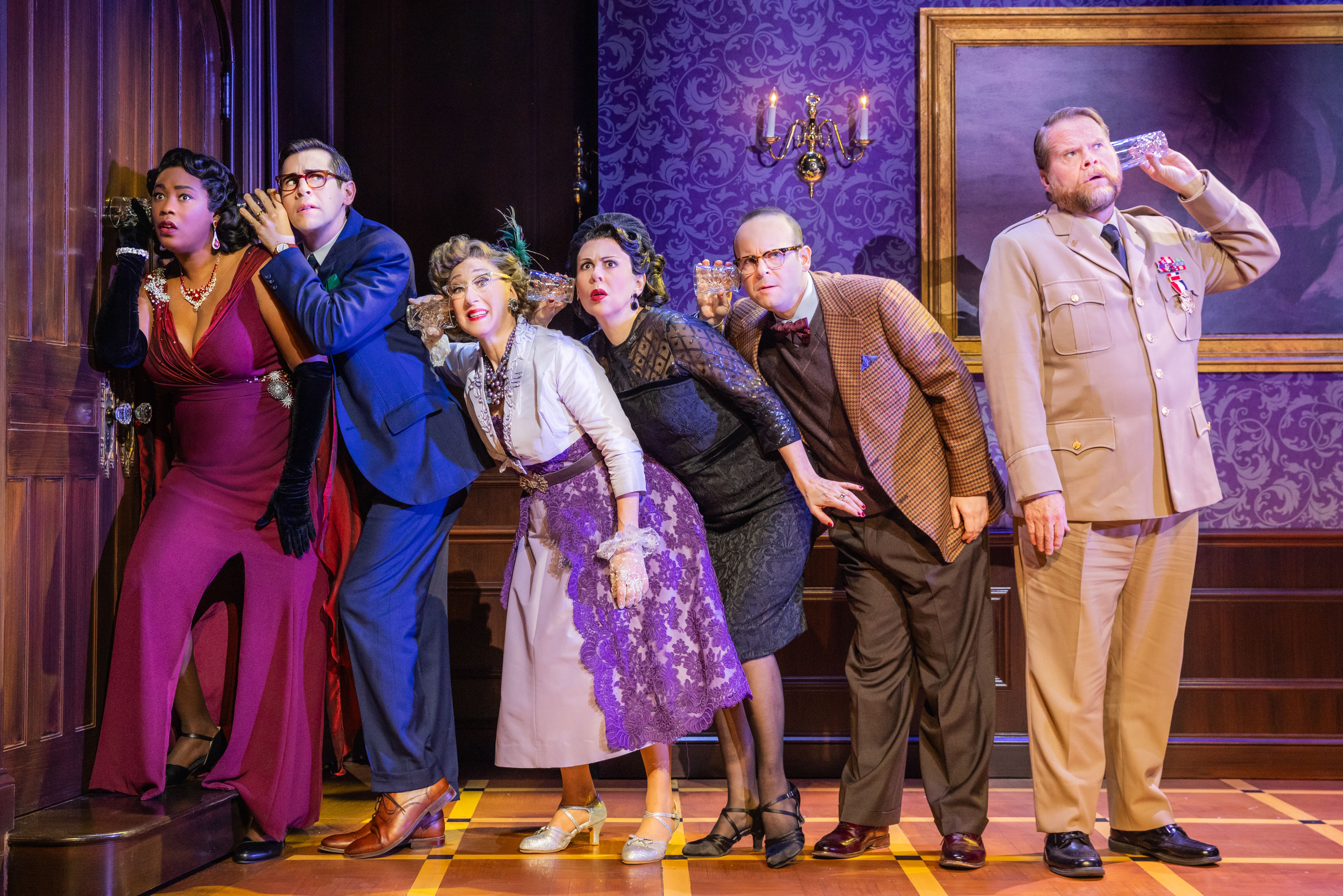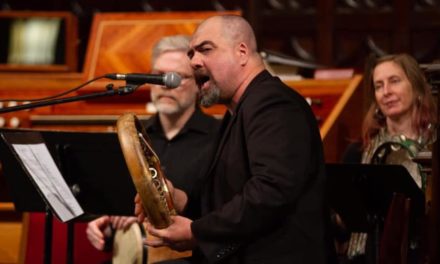Bekki Jo Schneider – February 2017. Photo by Jodi Cheetah Combs-Kalla
Remembering Bekki Jo Schneider
By Jon Huffman
Entire contents are copyright © 2018, Jon Huffman. All rights reserved.
Since her death from cancer on May 4th much has been written about Derby Dinner Playhouse Producer Bekki Jo Schneider and her achievements and contributions to our community and region. She was, after all, an extremely successful business leader in a field – for-profit theatre that’s not Broadway – in which the phrase “extremely successful business” is almost unheard-of. The list of awards, citations, and official recognition she received for her success, locally and nationally, is truly impressive.
And even though she had battled the disease for years, most of us who knew her still wonder how any human malady could actually have the power, the persistence – hell, the sheer nervy balls! – To take down Bekki Jo.
Even as we watched her grow weaker over the course of the last two years, no one – even among those of us younger than her – truly expected to outlive her: She taught us all the folly of underestimating her.
A product of Louisville’s South End, Bekki Jo was a Presentation Academy graduate, attended the University of Louisville, graduated from UK, and attended the Royal Academy Of Dramatic Art in London. But if it can be said about anyone in theatre that they learned their craft in the trenches, it can be said so of Bekki Jo.
By the mid-1980s, she had already been the Producing Director of Shakespeare In Central Park (later, The Kentucky Shakespeare Festival), the Producer of Louisville Children’s Theatre (later, StageOne Family Theatre), and the Producer of Lexington Children’s Theatre – leaving each one more successful than when she arrived.
In 1983, when Bekki Jo purchased Clarksville’s Derby Dinner, along with partner Carolyn Lamb and a small group of investors, it seemed like folly to those who underestimated her; at the time dinner theatres across the country were failing, en masse.
But Bekki Jo Schneider had always had a dream – to spend her life as a successful theatre artist in her hometown – and she had a plan to get there using methods honed from working in her formative years with the people who invented Louisville professional theatre.
While still in high school, she went to work for The Carriage House Players, the legendary group of local theatre pioneers out of whose ranks evolved Louisville’s professional theatre culture. There, Bekki Jo was both protégé of and colleague to C. Douglas Ramey, Ewel Cornett, Richard Block, Monte Priddy, Mitzi Friedlander, Warren Oates, and others who collectively created and populated the organizations which became Actors Theatre Of Louisville, StageOne Family Theatre, and Kentucky Shakespeare Festival. At one point in the late ‘50s, The Carriage House even briefly became the first dinner-theatre in the region (if not the country).
At The Carriage House, Bekki Jo was “The Kid”— who mopped the floor, ran lines with actors, applied their makeup for them, built costumes and sets, stage-managed, and jumped into roles with no rehearsal when actors fell ill. Through that hard work as a “Kid”, she learned the nuts and bolts of making theatre happen, but — just as important – she learned the craft of managing a company of artists while learning the art of serving Louisville’s local theatre audience.
She carried the lessons of success learned at The Carriage House with her forever, and often-cited three pillars when describing how to make a living as an impresario, in this order:
1) Take care of your company of artists and technicians and craftspeople as though they’re your family – their loyalty will measure your success.
Bekki Jo said often that her greatest joy as a producer was helping to make actors homeowners, wanting her family of theatre-makers to be firmly planted in the American Middle Class. At Derby Dinner Playhouse, she established a paid, floating “resident” company of actors, singers, and dancers, many of whom performed in several Derby shows a year. Bekki Jo was their willing matriarch, making sure they had work that paid, babysitting their kids when the need arose, advising them on everything from car-buying to wedding plans, bailing them out of jail, and providing eight meals a week to everyone working on a show. And she was the first one to hold and console them when life’s tragedies struck. In her lifetime, Bekki Jo employed hundreds, maybe thousands, of actors and craftspeople, many of whom moved here to work for her, then remained and set down roots.
2) Listen to your audience — without them you have nothing.
Bekki Jo’s finger was firmly planted on the pulse of her audience. She was quick to consult them when choosing Derby Dinner seasons. Hard to believe now, but in the 1980s, most dinner theatres didn’t operate with pre-picked seasons; each show opened with a tentative closing date and no definite plan for the next show. By defining theatre seasons, Bekki Jo was able to sell season-ticket packages to local audiences and also to the very lucrative tour bus/vacation circuit, which in turn boosted tourist income throughout Kentuckiana, earning Bekki Jo the kind of favor with local governments that most businesses covet.
3) Work harder and longer than anyone else.
Even though her cancer treatment (at least until the last few months of her life), Bekki Jo was the first one in the building each morning, usually at her office desk before 7 a.m., and often she was still there after the evening’s performance. When her own work was done, she did whoever else’s work needed doing, even if that meant pouring coffee for theatre diners in the evening.

Photo: Derby Dinner Playhouse
The often-underestimated Carriage House “Kid” learned well from her own mentors and, indeed, improved on the lessons gleaned from “The Pioneers”, none of whom achieved the continuous level of success or earned the accolades, of their protégé. Currently, Derby Dinner Playhouse has over 10,000 season-ticket holders. And year-round, nearly every performance of every show in its 500-seat arena, including the daytime Children’s Theatre season, is sold-out. It is, simply, the most successful theatre in the region.
But Bekki Jo Schneider’s theatre influence extends beyond Clarksville today. The region’s vibrant performing arts community is full of her artistic offspring – the “Grand Kids” of the Pioneers – who passed through Shakespeare In Central Park, Derby Dinner Playhouse, or the classrooms of every local university where she taught at various times, who moved on to their own careers as theatre-makers and theatre-educators. To list the names would be to create a Who’s-Who of today’s Kentuckiana theatre landscape. And beyond Kentuckiana, her protégés have made successful careers in the performing arts across the world.
And that was the fourth pillar on which she based her success: the need to pass it on. Bekki Jo was a fierce believer in the nobility of the Artist’s place in the story of human culture. She took her greatest professional pride in knowing that her spirit inhabited even a small sub-chapter in that story, and that because of the joy she brought to her work and the passion she inspired in those who learned from her, that story – The Artist’s Story – would grow on, would grow beyond her, and would continue to flourish in this region she loved so much.
Bekki Jo Schneider is missed, she is mourned, she is thanked.
And by many of us, she will always be celebrated.
Jon Huffman is an actor, writer, & director living in Louisville, Kentucky. He is Co-Artistic Director of Fleur De Lis Theatricals. He has appeared in Do You Feel Anger? at Actors Theatre of Louisville Titus Andronicus, Othello, The Tempest, The Merry Wives of Windsor at Kentucky Shakespeare; Hamlet, Number the Stars, The Odyssey, Treasure Island at StageOne Family Theatre; The Music Man, Man of La Mancha, A Chorus Line at Derby Dinner Playhouse




